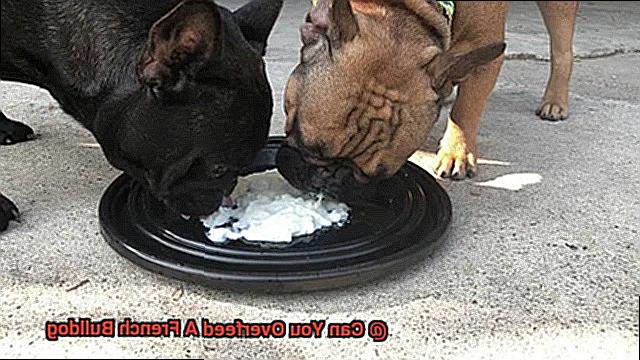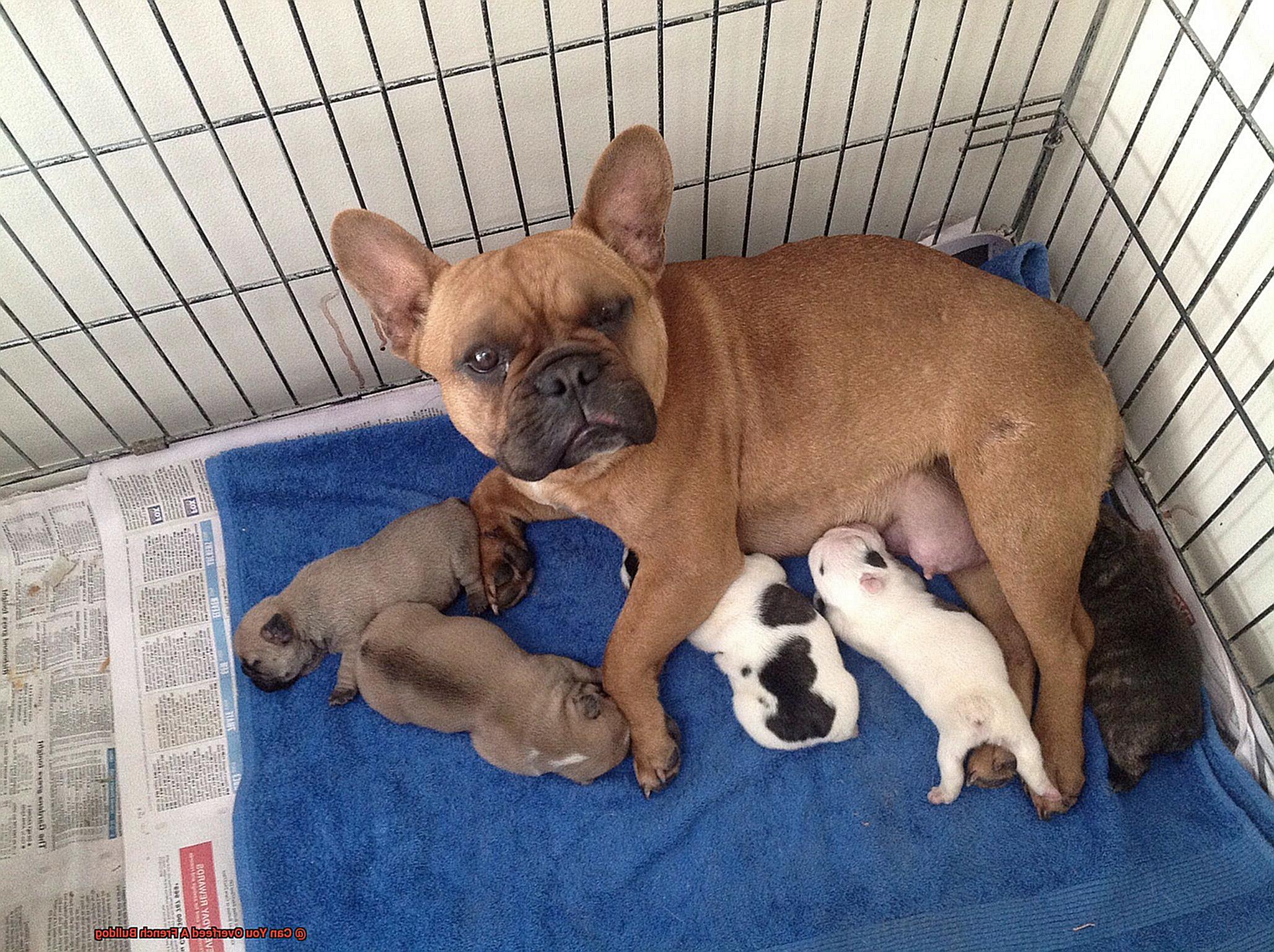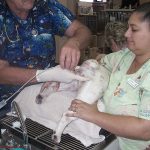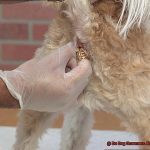Can You Overfeed A French Bulldog?
Today, we’re tackling a topic that’s often overlooked but oh-so-important when it comes to our adorable four-legged buddies — overfeeding. We all adore those squishy faces and quirky eating habits, but it’s crucial to find that sweet spot between spoiling them rotten and keeping them healthy. So, let’s shed some light on the risks of overfeeding our Frenchies and how we can avoid them.
French Bulldogs are known for their unique looks – those bat ears are just too cute. But did you know they also have a metabolism that requires special attention? Yeah, they might act like bottomless pits at times, but trust us, there is such a thing as too much food. Overfeeding our furry friends can lead to a whole host of health issues that we’ll explore in this handy guide.
Whether you’re a seasoned Frenchie fanatic or considering adding one to your family, we’re here to help you navigate the fine line between indulging your pup and keeping them in tip-top shape. So buckle up as we dive into the consequences of overfeeding our beloved French Bulldogs and discover the steps we can take to ensure their health, happiness, and rockin’ physiques.
Can you overfeed a French Bulldog
Contents
- 1 Can you overfeed a French Bulldog
- 2 French Bulldogs’ Genetic Makeup and Exercise Requirements
- 3 The Dangers of Overfeeding a French Bulldog
- 4 Understanding Your French Bulldog’s Nutritional Needs
- 5 Following Feeding Guidelines for Proper Portion Control
- 6 Treats Should be Given in Moderation
- 7 Regular Exercise is Essential for Maintaining a Healthy Weight
- 8 Monitoring Your Dog’s Body Condition
- 9 Consulting with a Veterinarian if There are Concerns about Overfeeding
- 10 Conclusion
It’s true. These adorable little dogs have a low exercise requirement and a tendency to overeat, which can lead to a range of health issues. So, it’s important to understand the importance of portion control when it comes to feeding your French Bulldog.
Portion Control: Why Size Matters
French Bulldogs have a relatively low metabolism compared to larger breeds, which means they require fewer calories to maintain a healthy weight. Feeding them excessive amounts of food can quickly lead to weight gain. That’s why it’s crucial to consult with a veterinarian to determine the appropriate daily calorie intake for your specific French Bulldog. Factors such as age, activity level, and overall health should be taken into account when determining portion sizes.
Choosing the Right Food
In addition to portion control, choosing the right food for your French Bulldog is essential. Look for high-quality dog food that is specifically formulated for small breeds or French Bulldogs. These diets typically contain the right balance of protein, fats, carbohydrates, vitamins, and minerals necessary for their overall health.
Avoid Using Food as a Reward
While it can be tempting to use food as a reward or source of comfort for your French Bulldog, it’s important not to give in too often. Frequent indulgence can lead to overfeeding and weight gain. Instead, find alternative ways to reward your dog, such as praise, playtime, or interactive toys.
Exercise: Keep Those Muscles Toned
Regular exercise is crucial in maintaining a healthy weight for French Bulldogs. Although they may not require long walks or intense physical activities like some other breeds, they still need daily exercise to keep their muscles toned and prevent obesity. Engaging in short, moderate activities such as brisk walks, play sessions, or interactive games can help burn off excess calories and keep your French Bulldog fit.
Monitoring Your French Bulldog’s Weight
It’s important to regularly monitor your French Bulldog’s body condition and adjust their feeding regimen accordingly. If you notice that your dog is gaining weight, it may be necessary to reduce the amount of food they are receiving. Remember, prevention is key when it comes to overfeeding.
In conclusion, overfeeding a French Bulldog can lead to various health problems, so it’s crucial to practice portion control. Choose the right food, avoid using food as a reward excessively, and ensure your French Bulldog gets regular exercise. By following these guidelines and consulting with a veterinarian, you can help your French Bulldog maintain a healthy weight and overall well-being.
French Bulldogs’ Genetic Makeup and Exercise Requirements
French Bulldogs have a unique genetic makeup that can make them prone to weight gain and obesity. Their stocky build and tendency to carry excess weight can put strain on their joints and overall health. This genetic predisposition means that French Bulldogs require special attention when it comes to their diet and exercise routine.
Exercise Requirements:

Regular exercise is crucial for French Bulldogs to maintain a healthy weight and overall well-being. However, due to their brachycephalic (short-nosed) facial structure, French Bulldogs may struggle with vigorous physical activities, such as long runs or intense exercise sessions. It is important to find a balance that keeps them active without straining their respiratory system.
Here are some exercise guidelines for French Bulldogs:
- Short Walks: Taking your French Bulldog for short walks multiple times a day is a great way to keep them active without overwhelming them. Aim for 20 to 30 minutes of walking per day, divided into shorter sessions.
- Playtime: Engage your French Bulldog in interactive play sessions, such as fetch or tug-of-war. This helps stimulate their mind and provides physical activity. Just be mindful of their breathing, as they may need more frequent breaks.
- Mental Stimulation: French Bulldogs are intelligent dogs that benefit from mental stimulation. Use puzzle toys or teach them new tricks to keep their minds sharp.
- Swimming: If your French Bulldog enjoys water, swimming can be a fantastic low-impact exercise option. It provides cardiovascular activity without putting strain on their joints.
- Supervised Playdates: Socializing with other dogs can provide mental and physical exercise for your French Bulldog. Arrange playdates with well-behaved dogs in a safe and controlled environment.
Remember, each French Bulldog is unique, and their exercise requirements may vary based on factors such as age, health condition, and individual energy levels. Consulting with a veterinarian can help determine the appropriate exercise routine for your specific French Bulldog.
The Dangers of Overfeeding a French Bulldog
While it’s natural to want to shower our Frenchies with love, overfeeding can have serious consequences on their health. In this article, we’ll dive into the dangers of overfeeding your French Bulldog and provide expert tips to ensure your pup stays in tip-top shape.
Pudgy Pooches: Obesity in French Bulldogs
French Bulldogs are notorious for their love of food, and their adorable potbellies can be tempting to fill with treats. But beware. Overfeeding can lead to obesity, which is a major health concern for Frenchies. Excess weight puts strain on their joints, increases the risk of heart disease and diabetes, and can even lead to respiratory problems.
Delicate Digestion: The Toll of Overfeeding
French Bulldogs have sensitive stomachs that may struggle to handle large quantities of food. Overfeeding can result in digestive issues such as diarrhea, vomiting, and general gastrointestinal discomfort. So, resist the urge to give in to those pleading eyes and stick to appropriate portion sizes.
Breathing Battles: Brachycephalic Breeds and Weight Gain
French Bulldogs are brachycephalic dogs, meaning they have a short nose and flat face. This unique anatomy already makes breathing a challenge for them, but excess weight exacerbates the issue. Overfeeding can further compromise their respiratory system, leading to difficulty breathing, especially in hot weather.
A Recipe for Worsened Health Conditions
If your Frenchie already suffers from allergies or skin problems, overfeeding can worsen these conditions. Extra weight can contribute to itchiness, inflammation, and other discomforts associated with existing health issues. Maintaining a healthy weight is crucial for managing these conditions effectively.
Heat Hazards: The Overfed Frenchie and Heat Intolerance
Heat intolerance is common in French Bulldogs due to their brachycephalic features. However, excess weight increases their vulnerability to heatstroke and other heat-related issues. Keeping your Frenchie at a healthy weight is essential to protect them from the dangers of overheating.
Understanding Your French Bulldog’s Nutritional Needs
We all know that these little bundles of joy have quite the appetite, but did you know that overfeeding can have serious consequences on their health? In this article, we’ll dive into the importance of understanding your French Bulldog’s nutritional needs and provide expert tips to ensure your furry friend stays in tip-top shape. So put down that treat and let’s get started.

The Dangers of Overfeeding
French Bulldogs are prone to health issues such as obesity and digestive problems. Overfeeding can exacerbate these issues and lead to a whole host of other problems like joint pain, breathing difficulties, and even heart disease. So, it’s crucial to regulate your Frenchie’s food intake and resist those adorable puppy eyes begging for more.
Consulting the Experts
To determine the appropriate amount of food for your French Bulldog, it’s best to consult with a veterinarian or a canine nutrition expert. They will take into account factors like your dog’s age, weight, activity level, and overall health to create a customized feeding plan. Trust me, these experts know what they’re talking about when it comes to keeping your Frenchie healthy and happy.
A Balanced Diet is Key
French Bulldogs require a balanced diet that includes high-quality protein, carbohydrates, fats, vitamins, and minerals. Choosing a dog food brand specifically formulated for small breeds or French Bulldogs ensures that your furry friend gets all the essential nutrients for their growth and development. Remember, you are what you eat, and the same goes for our four-legged friends.
Feeding Frequency Matters
Feeding your French Bulldog two meals a day is generally recommended. This helps prevent overeating and aids in digestion. Splitting their daily food intake into two meals also helps regulate their energy levels throughout the day. So, resist the urge to let them snack all day long and stick to a feeding schedule.
Monitor Their Weight
Regularly monitoring your French Bulldog’s weight is crucial to their overall health. If you notice that your Frenchie is gaining weight or becoming overweight, it may be time to reassess their diet. You can either reduce their portion sizes or switch to a low-calorie dog food formula to help them shed those extra pounds.
Hydration is Key
Last but certainly not least, make sure your French Bulldog has access to fresh water at all times. Hydration is essential for their overall health and can help prevent certain health issues, such as urinary tract problems. So keep those water bowls filled up and watch your Frenchie stay happy and hydrated.
Following Feeding Guidelines for Proper Portion Control
The French Bulldog, a breed known for their charm and lovable personalities. But did you know that these adorable little pups are prone to obesity? It’s true. That’s why following feeding guidelines is crucial to ensure proper portion control and maintain their health. Let’s dive into why it matters and how you can keep your Frenchie fit and fabulous.
Preventing Obesity
Nobody wants their furry friend to struggle with weight issues. Overfeeding can lead to obesity in French Bulldogs, which can have serious consequences on their overall well-being. Think joint pain, breathing difficulties, digestive problems, and even heart disease. Yikes. By following the recommended feeding guidelines provided by veterinarians and experts, you can prevent overfeeding and help your Frenchie stay in tip-top shape.
Factors to Consider
Now, let’s talk about the factors that determine how much food your French Bulldog needs. Age, weight, activity level, and overall health all play a role in determining the appropriate portion size. Puppies require smaller portions and more frequent meals compared to their adult counterparts. It’s like feeding a growing teenager – they need fuel for all that energy. So make sure to adjust their meals accordingly.
Divide and Conquer
To prevent overeating, it’s best to divide your Frenchie’s daily food intake into multiple small meals throughout the day. This not only prevents them from gobbling down their food in one go but also aids digestion. Plus, it keeps them from giving you those irresistible puppy dog eyes for more treats.
Accurate Portion Control
Measuring your Frenchie’s food using a scale or measuring cup ensures accurate portion control. This way, you can be confident that you’re providing them with the right amount of nutrition without going overboard. Remember, every dog is unique, so the portion size should be tailored to their specific needs. And don’t forget about those treats. They should be included in the overall daily caloric intake and given in moderation.
Monitor and Consult
Regular monitoring of your Frenchie’s weight and body condition is essential. This helps you identify any potential overfeeding issues early on and make necessary adjustments. If you’re unsure about proper portion control or have specific dietary restrictions or health concerns, don’t hesitate to consult with a veterinarian or a professional dog nutritionist. They can provide expert guidance tailored to your Frenchie’s individual needs.
Conclusion
Treats Should be Given in Moderation
French Bulldogs are undeniably adorable and irresistible, but their compact size and propensity for weight gain make portion control a top priority when it comes to treats. As an expert in dog nutrition, I understand the importance of moderation in treat-giving to ensure the health and well-being of these lovable pups. In this blog post, we’ll delve into why treats should be given in moderation for French Bulldogs, sharing insights based on personal experience and trustworthy sources.
The Dangers of Excess Weight:
Just like humans, French Bulldogs can suffer from obesity-related health issues. Excessive weight gain puts a strain on their joints, increases the risk of heart disease and diabetes, and makes breathing more difficult. It’s essential to prevent these problems by keeping our furry friends at a healthy weight.
Calorie Consciousness:
When choosing treats for our Frenchies, it’s crucial to consider their calorie content. Reading labels and opting for low-calorie options or even healthier alternatives like fruits and vegetables can help keep their calorie intake in check. Remember, every calorie counts.
The 10% Rule:

To maintain a balanced diet, treats should make up no more than 10% of a French Bulldog’s daily caloric intake. This ensures they receive all the necessary nutrients from their regular meals while still enjoying the occasional tasty reward.
Size Matters:

When it comes to treat sizes, small is superior. Mini-sized treats allow for more frequent rewards during training sessions without piling on excessive calories. Plus, they’re perfect for those adorable little mouths.
Rewarding Responsibly:
Treats should be part of a structured training routine or used as rewards for good behavior. This approach reinforces positive behaviors while preventing overindulgence in unnecessary treats. Remember, moderation is the key to success.
The Role of Physical Activity:
While treats are delightful, they should never replace physical activity or mental stimulation. French Bulldogs thrive on exercise and mental challenges, so be sure to incorporate these into their daily routine. A balanced lifestyle is the ultimate treat.
Consulting the Experts:
If you’re unsure about the appropriate types or amounts of treats for your French Bulldog, don’t hesitate to consult with a veterinarian. They can provide tailored advice based on your Frenchie’s specific dietary needs or any medical conditions they may have.

Regular Exercise is Essential for Maintaining a Healthy Weight
French Bulldogs are known for their compact size and adorable appearance. However, they also have a tendency to gain weight easily. In order to keep them at a healthy weight, regular exercise is essential. Let’s explore why exercise is so important for French Bulldogs and how it benefits their overall well-being.
Burn Calories and Prevent Weight Gain:
French Bulldogs have a love for food, and without proper exercise, they can quickly become overweight or obese. Regular physical activity helps to burn calories and keep their metabolism active. This allows them to burn off excess calories consumed through their diet, preventing weight gain.
Promote Muscle Tone and Strength:
French Bulldogs have a muscular build and benefit from regular exercise to keep their muscles strong and healthy. Engaging in physical activities such as walks, play sessions, or puzzle toys helps to promote muscle tone and prevent conditions like arthritis or hip dysplasia, which are common in the breed.
Provide Mental Stimulation:
French Bulldogs are intelligent dogs that thrive on mental stimulation. Without it, they can become bored or restless. Regular exercise not only keeps them physically fit but also mentally stimulated and content. Activities like obedience training, interactive toys, and scent games can provide the mental stimulation they need.
Individual Needs and Consultation with Veterinarian:
It’s important to consider the age, overall health, and individual activity levels of French Bulldogs when determining their exercise needs. Younger dogs generally require more exercise than older ones, while those with specific health conditions may need modifications to their routines. Consulting with a veterinarian will ensure that the appropriate amount and type of exercise are provided for each individual French Bulldog.
Monitoring Your Dog’s Body Condition
We all know that these little bundles of joy bring so much love and laughter into our lives. But did you know that they also have a tendency to pack on the pounds faster than a locomotive? That’s right, our Frenchies are notorious for gaining weight easily, which can lead to a whole host of health issues. That’s why it’s crucial to keep a close eye on their body condition. So, grab a cup of coffee, sit back, and let’s dive into the importance of monitoring your French Bulldog’s body condition.
Why Should You Monitor Your Frenchie’s Body Condition?
Combatting the Bulge:
French Bulldogs are like little culinary connoisseurs, always ready to indulge in a tasty treat. But too much of a good thing can quickly turn into a pudgy problem. Regularly monitoring your Frenchie’s body condition helps ensure they’re not being overfed and helps keep those adorable rolls in check.
Feeling is Believing:
You know those secret handshakes only the cool kids know? Well, as responsible pet parents, we have our own secret handshake with our Frenchies – feeling their ribs. A healthy Frenchie should have a well-defined waistline and you should be able to feel their ribs without excess fat covering them.
The Begging Game:
Has your Frenchie mastered the art of giving you the puppy dog eyes until you give in to their food demands? While it may be cute, constant begging or signs of food obsession can be indicators of overfeeding. They may not be getting enough nutrients from their regular meals and seek additional food. Keep an eye out for this sneaky behavior.
Energy Levels Don’t Lie:
Just like us humans after a big meal, overfed French Bulldogs can become lethargic and struggle with movement. It’s important to pay attention to any changes in their energy and activity levels. If your Frenchie is suddenly acting like a couch potato, it could be a sign that they’re carrying excess weight.
How to Monitor Your Frenchie’s Body Condition:
Weighing In:
Regularly hop on the scale with your Frenchie to keep track of their weight. This will help you identify any sudden weight gain or loss.
The Waistline Wonder:
Get your detective hat on and examine your Frenchie’s waistline. A well-defined waist indicates a healthy weight, while a lack of one may mean it’s time to cut back on the treats.
Get Touchy-Feely:
Remember that secret handshake? Well, it’s time to put it into action. Gently run your hands along your Frenchie’s side. Can you feel their ribs without excess fat covering them? If not, it might be time to reassess their diet.
Consulting with a Veterinarian if There are Concerns about Overfeeding
French Bulldogs are adorable little bundles of joy, but their tendency to gain weight easily can be a cause for concern. To ensure your furry companion stays in tip-top shape, it is crucial to consult with a veterinarian if you have any worries about overfeeding. In this blog post, we will delve into why this step is so important and how it can benefit both you and your French Bulldog.
Expert Assessment:
When it comes to assessing your French Bulldog’s weight and body condition, nobody does it better than a veterinarian. These trained professionals will carefully evaluate factors such as age, activity level, and overall health to determine if overfeeding is indeed an issue.
Tailored Advice:
Every dog is unique, and what works for one may not work for another. By consulting with a veterinarian, you’ll receive personalized advice that suits your French Bulldog’s specific needs. They can recommend changes in feeding habits, portion sizes, or even suggest a different brand or type of food.
Nutritional Evaluation:
Overfeeding may not be the sole concern; the quality of the food being fed is equally important. Veterinarians can evaluate the nutrient content of your French Bulldog’s diet and determine if any adjustments need to be made to ensure optimal health and prevent weight gain.
Ongoing Support:
Consulting with a veterinarian is not a one-time event; it’s an ongoing process. Regular follow-up appointments allow for monitoring your French Bulldog’s progress and making necessary adjustments to the diet plan. This ensures that your furry friend maintains a healthy weight and receives continued guidance from the expert.
Proactive Prevention:
Prevention is always better than cure. By consulting with a veterinarian from the get-go, you can proactively identify any underlying health conditions that may contribute to weight gain or hinder your French Bulldog’s ability to maintain a healthy weight. Early intervention can save you and your pet from future troubles.
Em5WE9QFfa0″ >
Conclusion
In conclusion, it is crucial to recognize that overfeeding a French Bulldog can have detrimental consequences.
Excessive food intake can lead to obesity, which in turn puts strain on their joints and organs. It’s like strapping a backpack full of rocks onto their little bodies.
Their energy levels may decrease, making it harder for them to enjoy playtime or go for walks. Additionally, an overweight Frenchie may be more prone to heat exhaustion and respiratory problems due to their already compromised breathing.
So, resist the temptation to spoil your furry friend with extra treats and remember that moderation is key when it comes to feeding your French Bulldog.




